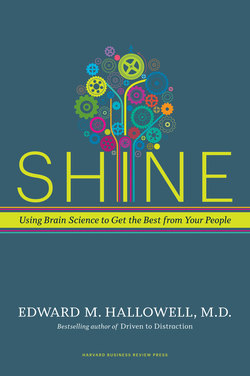Читать книгу Shine - Ned Hallowell - Страница 11
На сайте Литреса книга снята с продажи.
The Latest Research
ОглавлениеIn transferring my plan from the world of children, families, and schools to the world of businesses and organizations, I got lucky in my timing. As I was developing my ideas, the world burst with new research in several critically relevant fields.
First, neuroscience exploded in the 1990s, the “decade of the brain.” The explosion has continued since then, with surprising discoveries that inform and bolster my plan, such as neuroplasticity (the fact that the brain can change throughout life) and the ability to promote brain growth through certain actions and activities.
Second, not only did the world of brain science change, but the world of psychology took a radical positive turn as well. Spearheaded by Martin Seligman, positive psychology emerged as the brightest, most useful new paradigm in psychology since the days of B. F. Skinner and his behaviorist theories. Instead of dissecting what’s wrong with a person, positive psychology focuses on how to help people live and achieve at their highest and happiest levels. For example, thanks to the research of Mihaly Csikszentmihalyi, another leader in the positive psychology movement, we know the conditions under which a person’s brain is most likely to “light up” and surpass its previous best.
And third, researchers started to take the oddly neglected psychological state called happiness seriously. They deepened its definition beyond mere sensate pleasure, and they learned how critical a positive state of mind—a happy state of mind, dare we say it?—truly is to achieving at your best. The old saw that excellence occurs in direct proportion to suffering is dead wrong. Excellence occurs in direct proportion to necessary suffering, but in inverse proportion to unnecessary suffering. We know this now because researchers finally looked scientifically at the roots of happiness and well-being, and how such factors contribute to performance.
These major breakout developments in three different areas provided me with a bonanza as I synthesized my theory of the Cycle of Excellence.
In addition to Seligman’s work, I drew upon the research of a wide range of other experts, including Daniel Gilbert, a Harvard professor whose book Stumbling on Happiness is full of counterintuitive insights; Don Clifton, Tom Rath, Marcus Buckingham, and others from the Gallup organization and the strength-based movement; Mihaly Csikszentmihalyi, originator of the concept of “flow”; George Vaillant, the Harvard psychiatrist who did the famous Grant study, a longitudinal study that followed one class of Harvard graduates for decades while identifying the variables that correlated most closely with success, health, happiness, and well-being; David Myers, another great researcher into the field of what makes for a satisfying life; Carol Dweck, the Stanford psychologist who gave us the powerful concept of the “growth mind-set”; Nicholas Christakis and James Fowler, whose work on social networks and connections sparkles with insights relevant to organizations; Stuart Brown, whose research into play shows how profoundly powerful play is for innovative thinking and even life itself; Marco Iacoboni, neurologist and neuroscientist whose work on “mirror neurons” gives insight at the cellular level into how and why people connect; Angela Duckworth, the University of Pennsylvania psychologist whose research into what she calls “grit” is showing that determination trumps IQ in predicting performance; my close friend, John Ratey, whose book Spark: The Revolutionary New Science of Exercise and the Brain shows how useful—yet undervalued—physical exercise is in promoting mental acuity; Kathy Kolbe, whose explication of “conation,” the most important word/concept you’ve never heard of, gives managers an amazing new framework for understanding how to get the best out of people; and many others in the fast-advancing interdisciplinary world of peak performance research.
While, as an MD, my own knowledge of human physiology and brain function helped me synthesize the Cycle of Excellence, all of this new research served as important guides, dispelling some of the myths that have misled people about high achievement. These myths include “IQ predicts success” (it doesn’t), “hard work conquers all” (paradoxically, hard work can sabotage success by leading you to try to overpower a problem rather than figure it out), and “the brain is hard-wired and unable to change once a person reaches adulthood” (wrong!).
